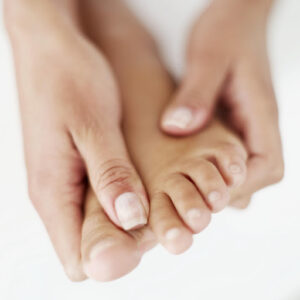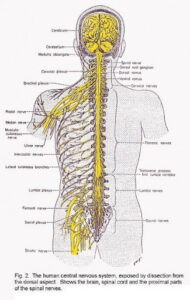“Neuropathy” is the term used to describe disease or damage of the nerves in the body. The “peripheral nervous system” is made up of the nerves that branch off of the spinal cord and go to all of the parts of the body, like the branches and twigs on a tree. It is the information superhighway of our body. The term used to describe disorders of these nerves is Peripheral Neuropathy (PN).
People with neuropathy often complain of:
- Burning feet at night

- Numbness, tingling or shooting pains
- Hot or cold feelings in the hands or feet
- Restless legs
- Having to “shake out” their hands at night
- Dropping objects
- Hands and feet that feel swollen
- Poor sense of balance
- Cuts and scrapes taking longer to heal
- Pain when someone touches them
Roughly 20 million people in the US suffer from neuropathy. A large percentage of diabetics will eventually develop peripheral neuropathy. Other common causes of neuropathy include carpal tunnel syndrome, herniated discs, thyroid problems, alcohol use, chemotherapy and certain genetic disorders. People with damage or dysfunction of their nervous system are more prone to injury from falls, burns, infection and arthritis.
 Some neuropathies develop slowly and others come on suddenly. A person may feel many different symptoms depending on what type of nerve damage they have. Most often, it is the longest nerves that show the first signs of damage as they die back from the toes towards the spine. It is very common for people with peripheral neuropathy to lose their sense of where their feet are in space, causing them to have a poor sense of balance and fall more easily. Early signs of neuropathy include weakness, loss of reflexes and decreased sensation. Quite often, these subtle signs go unnoticed by the patient because the brain makes up for the difference of these losses. These subtle early signs of PN can only be detected with a proper clinical exam by a trained professional. If undetected, or allowed to progress, many of these patients will gradually begin to experience the tingling, burning, biting, pin pricking, restless, stabbing and electrical pains associated with peripheral neuropathy. These symptoms can become very disabling and tend to be worse at night. Once they begin, they gradually get worse. If uncontrolled, some patients with peripheral neuropathy can eventually become unable to walk.
Some neuropathies develop slowly and others come on suddenly. A person may feel many different symptoms depending on what type of nerve damage they have. Most often, it is the longest nerves that show the first signs of damage as they die back from the toes towards the spine. It is very common for people with peripheral neuropathy to lose their sense of where their feet are in space, causing them to have a poor sense of balance and fall more easily. Early signs of neuropathy include weakness, loss of reflexes and decreased sensation. Quite often, these subtle signs go unnoticed by the patient because the brain makes up for the difference of these losses. These subtle early signs of PN can only be detected with a proper clinical exam by a trained professional. If undetected, or allowed to progress, many of these patients will gradually begin to experience the tingling, burning, biting, pin pricking, restless, stabbing and electrical pains associated with peripheral neuropathy. These symptoms can become very disabling and tend to be worse at night. Once they begin, they gradually get worse. If uncontrolled, some patients with peripheral neuropathy can eventually become unable to walk.
There are several types of peripheral neuropathy:
Our nerves contain large and small fibers (axons) surrounded by insulation called myelin. Some types of neuropathy affect one type of fiber more than the other, and others affect the myelin more than the axons. Large fiber neuropathies often result in weakness, decreased sensation, poor balance and decreased reflexes. These types of neuropathy are sometimes discovered on exam before a patient is even aware there is a problem. Small fiber nerves relay information about pain and temperature and also control many of the organs in our body. Patients with small fiber neuropathies tend to complain of burning hot pain, coldness, biting pain, pins and needles, swelling, and organ problems such as indigestion, irregular heartbeat, impotence and light-headedness or fainting when getting up fast.
How is neuropathy diagnosed?
A thorough history and clinical exam are the best way to screen for neuropathy. In some cases, special testing such as EMG/NCV tests are required to help determine what type of neuropathy exists, and how severe it is. Once nerve disease is identified, blood work is sometimes performed to determine the cause and follow-up care.
How is peripheral neuropathy treated?
 In some cases, peripheral neuropathy can be caused by a vitamin deficiency or excess. In these cases, there may be a relatively easy way to manage, or even cure, neuropathy symptoms. Unfortunately, other forms of peripheral neuropathy are more difficult to cure. For these cases, we look to manage the symptoms and delay the progression of the problem. Sometimes medications can help ease the pain. For diabetic patients, strict blood sugar control is of utmost importance.
In some cases, peripheral neuropathy can be caused by a vitamin deficiency or excess. In these cases, there may be a relatively easy way to manage, or even cure, neuropathy symptoms. Unfortunately, other forms of peripheral neuropathy are more difficult to cure. For these cases, we look to manage the symptoms and delay the progression of the problem. Sometimes medications can help ease the pain. For diabetic patients, strict blood sugar control is of utmost importance.
If you are one of the many people suffering from neck pain, chronic lower back pain, scoliosis, sciatica or another spine-related condition, you will be in great hands at Connecticut Back Center (CBC). CBC was founded by Jesse Eisler, MD, PhD, in 2005 and with offices in Vernon and Bloomfield, CT serves the Greater Hartford and Central Connecticut area. Our mission is to provide accurate, responsive and effective spinal care with comprehensive non-surgical and surgical treatments for the full spectrum of spinal disorders. Our goal is always to reduce your pain, increase your flexibility and help you resume an active life after treatment. To learn more about your treatment options, give us a call at (860) 253-2714 or request an appointment online now.

